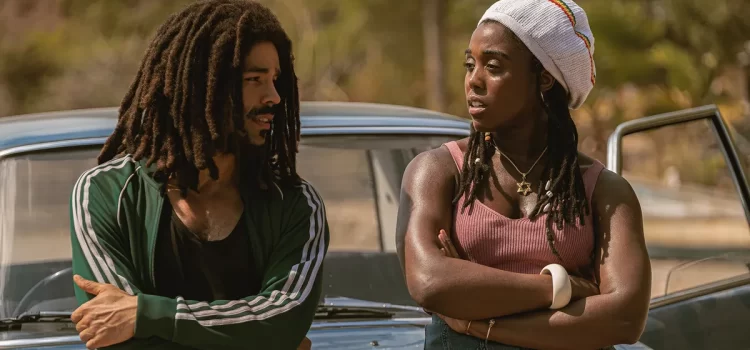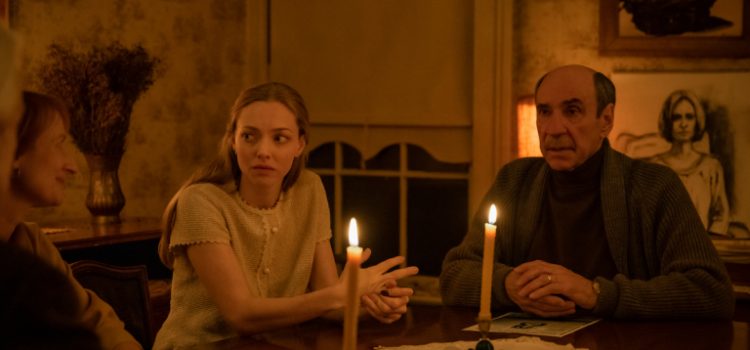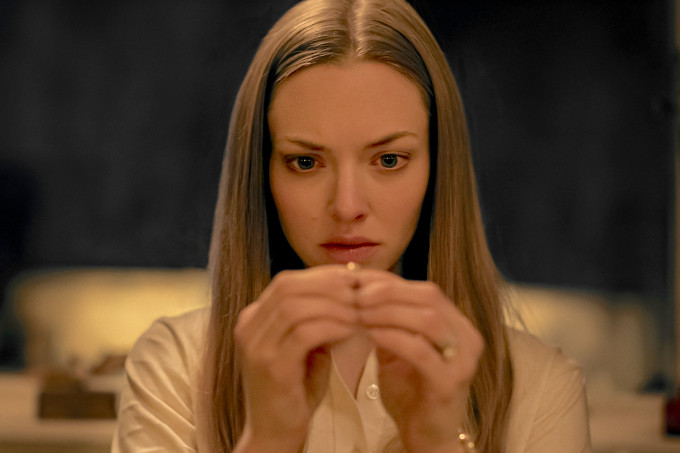By Lynn Venhaus
As good as Kingsley Ben-Adir is portraying the reggae icon in “Bob Marley: One Love,” the movie’s script fails to hit the right notes, and the result is a disjointed, unsatisfying profile.
Made in partnership with Marley’s widow Rita and two children Ziggy and Cedella, the film celebrates Marley’s life and music as Jamaica’s most famous citizen who never wavered in his message of love and unity, broke boundaries and promoted healing in his country – although the timeline is wonky here.
The trio of screenwriters Zach Baylin, Frank E. Flowers and Terence Winter plus director Reinaldo Marcus Green narrowly focused on the years 1976-1978, when Marley was at the height of his career, and then he learned he had cancer. Now, granted, this isn’t a documentary, it’s “inspired by a true story,” but they have left out some key details of his life.
At the onset, the film explains that warring political factions heightened danger on the island, and an assassination attempt was made on Marley’s life. On Dec. 3, 1976, two days before the free Smile Jamaica Concert he organized, he was wounded, Rita was shot in the head, and manager Don Taylor had serious injuries.
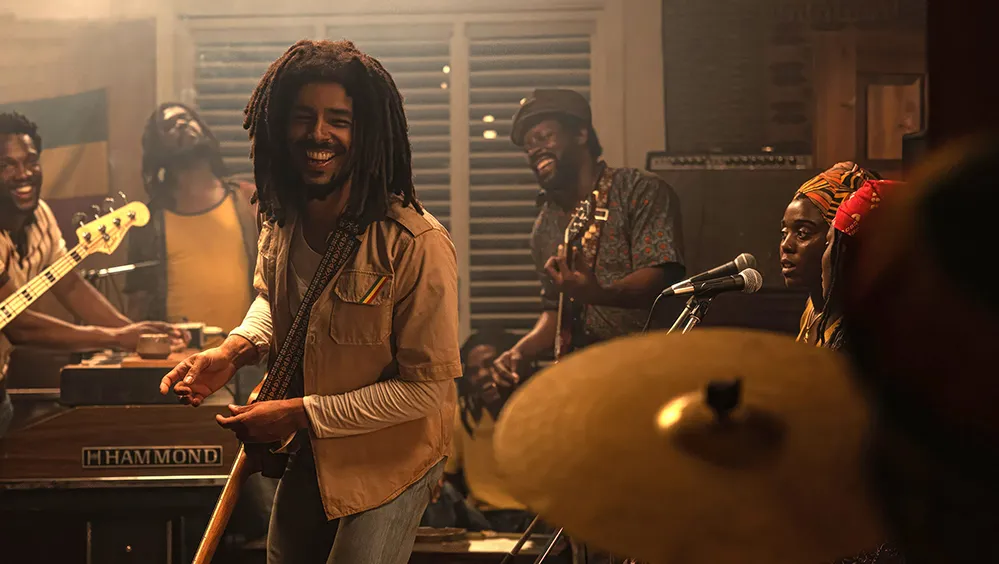
He moved to London to escape, toured Europe, and recorded his acclaimed album “Exodus.” (He also made “Kaya” then, but that’s omitted).
When a toe injury didn’t heal, he was diagnosed with acral lentiginous melanoma, a rare skin cancer, but didn’t stop touring – for a while. (Tragically, he died at age 36 in 1981, after cancer spread to other areas).
Green, who directed “King Richard” about Venus and Serena Williams’ father, presents part of Marley’s journey in flashbacks that focus on imagery without context – his childhood years with a white absentee father, and he leaves with his mother, plus nods to his faith in Rastafari. Those, in repetition, cloud the story instead of illuminate.
The film mentions Haile Selassie I, the emperor of Ethiopia who was considered a god in the religion, but doesn’t explain much about it. Rastafari originated in poor Afro-Jamaican communities in the 1930s as reaction to British Colonial culture and is rooted in Protestant Christianity and mysticism.
Marley’s relationship with his wife, Rita, well-played by Lashana Lynch, began as teenagers, and she was also in his band, The Wailers, as one of the back-up singers of “I Threes” after Peter Tosh and Bunny Wailer left. They married in 1966. Both came from the Trenchtown neighborhood in Kingston.
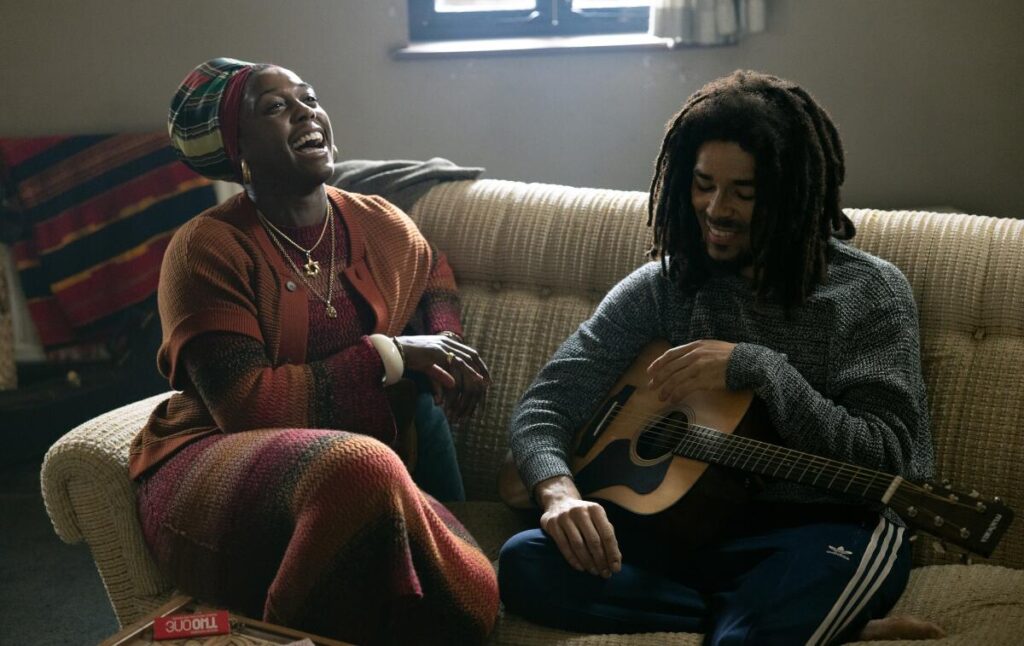
It is not clear that the three children they had together are among the 11 recognized as Marley’s, for they both had extramarital affairs. Cedella, David “Ziggy,” and Stephen are theirs, and Bob adopted Sharon, Rita’s daughter from a previous relationship. There is no mention that he had six other children with six different women between 1972 and 1978.
How Marley became a music legend, with his unique blend of reggae, rocksteady, and ska, isn’t given much air either – you’ll have to either be familiar with his rise in the music business or read about it later.
Marley returned to Jamaica in April 1978 to much fanfare, and presented the One Love Peace Concert, his attempt to unite opposing political parties. It is only in the archival footage at the film’s end that the political leaders shake hands – populist prime minister Michael Manley and Edward Seaga, head of the opposing Jamaica Labour Party, but it did not end the island’s violence and political tensions.
In fact, what the movie doesn’t say is that the concert’s two organizers were killed in the years following, and 1,000 more people died in 1979-80.
Now the music is a high point, as expected. Many of the hits, including “Jamming,” “Get Up/Stand Up,” “I Shot the Sheriff,” “One Love/People Get Ready,” and “This Is Love” are included in the soundtrack.
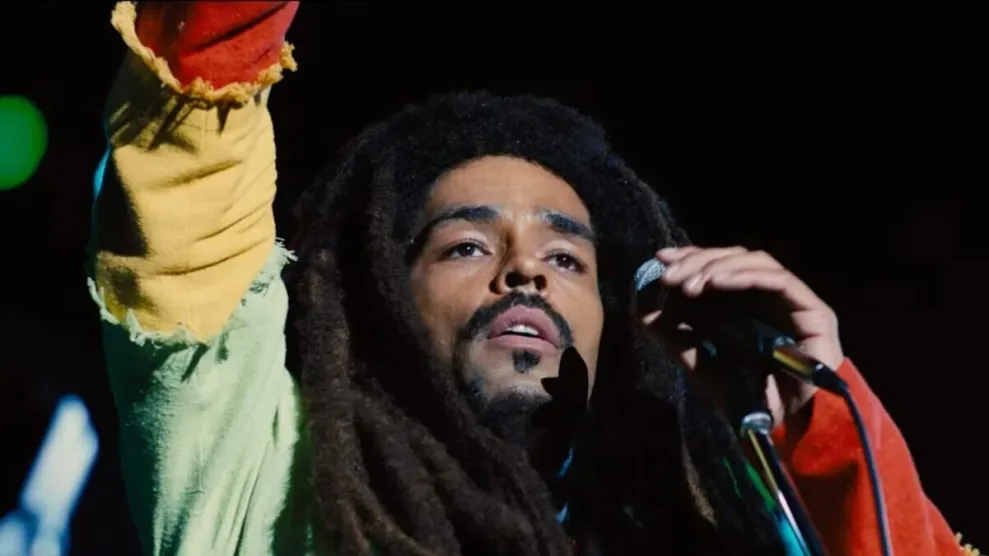
One of the most touching scenes is when Marley plays “The Redemption Song” for his family while sitting around a fire, and his wife asks him: “When did you write that?” and he answers: “All my life.”
Ben-Adir, who was impressive as Malcolm X in “One Night in Miami” and amusing as one of the Kens in “Barbie,” immerses himself in a virtuoso performance. Not only did he nail the accent, speech pattern and movements of the man, but he also sang and played guitar.
Kris Bowers composed the film’s score, using Marley’s music as a foundation. Costume designer Anna B. Sheppard captured the culture and the period well, as did production designer Chris Lowe.
Despite the appealing music and the mega-watt turn by Ben-Adir, “Bob Marley: One Love” is too fragmented. It fails to offer something more scintillating overall, and lands merely as an average Hollywood biography.
“Bob Marley: One Love” is a 2024 biopic directed by Reinaldo Marcus Green and starring Kingsley Ben-Adir, Lashana Lynch, and James Norton. It is rated PG-13 and the runtime is 1 hour, 47 minutes. It opens on Wednesday, Feb. 14. Lynn’s Grade: C.


Lynn (Zipfel) Venhaus has had a continuous byline in St. Louis metro region publications since 1978. She writes features and news for Belleville News-Democrat and contributes to St. Louis magazine and other publications.
She is a Rotten Tomatoes-approved film critic, currently reviews films for Webster-Kirkwood Times and KTRS Radio, covers entertainment for PopLifeSTL.com and co-hosts podcast PopLifeSTL.com…Presents.
She is a member of Critics Choice Association, where she serves on the women’s and marketing committees; Alliance of Women Film Journalists; and on the board of the St. Louis Film Critics Association. She is a founding and board member of the St. Louis Theater Circle.
She is retired from teaching journalism/media as an adjunct college instructor.

